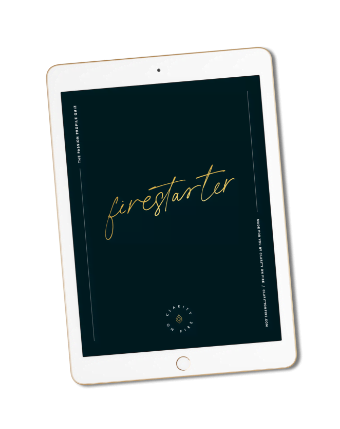I’m forever talking with clients about their “inner critic.”
I know you know what I’m talking about …
It’s that voice in your head that tells you all the reasons you’re not good enough to have the job, the relationship, the body, the promotion, the money, etc., that you want.
It says things like, “If you would stop being such a lazy procrastinator, maybe you’d ever get a raise.” Or “If you lost 10 pounds, then you’d be asked out on more dates.”
The inner critic is mean! It sounds a lot like the know-it-all bully from your high school, or like your frenemy who’s always giving you backhanded compliments. It says things to us that we would never in a million years say to another person.
My inner critic especially loves hating on me about exercise (or, I should say, my lack of consistent exercise). It’ll judge me if I only make it to the gym once in the span of a week: “Seriously?? You work for yourself and make your own schedule, but you can only find ONE time in the week to go to the gym? How lazy is that?!”
{Told you it was a bully!}
This past week, it seemed like almost all of my clients were talking about their inner critic voice, so I finally decided to ask a few of them, “OK, you’re aware of your inner critic voice, right? So what makes you to listen to it sometimes?”
WHY WE LISTEN TO OUR INNER BULLY
All of them said some variation of the same thing: “As much as I hate that inner critic voice, it does motivate me to do things that I probably wouldn’t do otherwise.”
It makes sense. The inner critic is kind of like your personal drill sergeant. It’ll use whatever fear tactics it can to get you to do what you know you “should” do. You’ve definitely heard it tell you things like …
“You should really order the salad instead of the alfredo pasta. Your thighs are looking a little jiggly lately…”
“Who cares if you’re not feeling well today?? You’d better get to work and finish that report. If you turn one more thing in late, you’re probably going to get fired.”
“You know how awful and lazy you feel when you don’t work out. Time to get your butt to the gym!”
“Better not speak up in the weekly team meeting, even though you don’t totally agree with the vision of this project. They’ll probably judge you and think your ideas are dumb.”
Your inner critic loves to use doom-and-gloom worse-case-scenarios to scare you into doing what it deems “right.” It’ll also go for the jugular and criticize a part of you that you’re already sensitive about. It uses all of its dirty, cruel tricks until something works to get you to do (or NOT do) what it thinks is best.
THIS DOES WORK … BUT IT SUCKS
The worst part is that, most of us let our inner critic win! At least often enough that it thinks it has some power over us. And so, we keep the pattern going.
The reason we let it win is that … well, judging and criticizing yourself unfortunately does work as a motivator sometimes. And for some of us, it’s the only way we know to self-motivate … so we keep allowing this inner voice to bully us, even though it feels awful.
![]() Self-criticism is a crappy way to motivate yourself.
Self-criticism is a crappy way to motivate yourself.
I think we can all agree that, even if the inner critic does work to get you up and moving, it’s a really crappy way of getting yourself to do anything. Plus, it’s straight-up not sustainable. Eventually, the self-criticism and constant negativity will wear on you and you’ll say, “Screw it,” and binge-watch Empire all afternoon with a family-sized bags of chips to it numb out … until the cycle starts all over again.
THERE ARE WAY BETTER WAYS TO MOTIVATE YOURSELF
OK, so if self-criticism works but feels crappy … how else can you motivate yourself instead?
Well, I don’t believe in one-size-fits-all solutions, but I’m personally going through this myself right now (specifically about getting motivated to do a sugar detox), so I’ll tell you what’s working for me:
First, it’s important to examine whether you really want to do it. Your inner critic will sometimes convince you to do things that you don’t actually want, but feel like you should do for some external reason. We all face way too many “shoulds” in our life, so make sure you actually want this and are not doing it from a place of obligation. For me, doing a sugar detox is something I felt called to try — even though I’m really not looking forward to giving up my coffee creamer and gluten-free evening cookies, my health is worth way more to me.
Visualize the awesome outcome you want. The inner critic will try to scare you with the worst-case scenario, so it’s up to you to paint a mental picture of the best-case scenario. Do you want to feel healthy and vibrant? Do you want to impress the pants off your boss when you turn your report in early? How badass would it feel to ask for (and get) the raise you deserve? Really tap into the emotion of how your perfect outcome will feel.
Get accountability. Make sure to choose someone who believes in that vision you have for yourself and can remind you why you want it. I’ve already told multiple friends (and now I’ve told all of you!) that I’m doing a sugar detox in a few weeks, so now I have to actually follow-through. When your inner critic voice starts to take over, hit up your accountability partner. {We’re not meant to go it alone, remember?}
![]() Visualizing what you DO want, instead of avoiding what you DON’T want, is a way better motivator.
Visualizing what you DO want, instead of avoiding what you DON’T want, is a way better motivator.
Lastly. I want to remind you to give yourself a break sometimes. Your inner critic will tell you you’re NEVER doing enough. Please, please, please take it (and yourself) less seriously sometimes. The point of life isn’t to spend your entire existence doing all the things you “should” do — it’s supposed to be fun. So don’t let your inner critic turn your dreams, goals, and visions into another obligation.
Leave a comment to let me know how this topic resonates with you today!
Much Love,
Kristen (+ Rachel)
[hr style=”1″ /]
SPOTLIGHT ON … DARING GREATLY
We’re doing something new. At the end of each blog, we’re going to take a beat to share something meaningful with you. Maybe it’ll be something we read that really moved us. Maybe something we’re currently offering that’s going to really help you out (like the PPVE, when it’s around). Or maybe it’s an empowering story about one of our clients.
Today, we want to share something that’s profoundly helped millions of people, us and our clients included.
There are a few book so powerful, important, and revolutionary that we refer to them over and over again in all of our coaching conversations.
Daring Greatly by Brené Brown is one of them.
We bring it up today, in particular, because Daring Greatly is basically the textbook on how to rewrite self-criticism, fear, and shame. The title comes from the famous quote by Teddy Roosevelt:
“It is not the critic who counts; not the man who points out how the strong man stumbles, or where the doer of deeds could have done them better. The credit belongs to the man who is actually in the arena, whose face is marred by dust and sweat and blood; who strives valiantly … who at the best knows in the end the triumph of high achievement, and who at the worst, if he fails, at least fails while daring greatly.”
If you want to learn how the courage to be vulnerable can transform your entire life … we highly recommend you read this book.




About 15 years ago when I decided to actually ‘for real’ stop smoking I realized that I needed to turn my inner critic ‘drill sergeant’ into a motivational speaker. What I did was so simple I can’t believe I didn’t think of it before. Anytime I’d feel the urge to smoke I envisioned watching my life as a movie, where my ‘inner critic’ became the ‘best friend’ of my ‘smoking self’. And just like in the movies this ‘best friend’ would always show up at the right time with the right words to stop me from doing what I knew I really didn’t want to do (like smoke). It worked! Since it was so successful, I’ve kept using this trick whenever my inner critic becomes too volatile. I’ll just stop, replace the horrible person with my ‘best friend’, and we’ll deal with the issue in a positive manner. Does it always work? No. But it works more times than not, and I’ll take that any day of the week.
Cathrine … this is such a good strategy. Seriously, I’m so impressed you realized how important it was to change your inner dialogue! So many people live for YEARS under the dictator-like regime of their inner critic and never realize how much easier it is to speak to yourself like a friend. I’m glad you’re proving that it works! 🙂